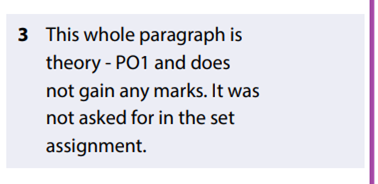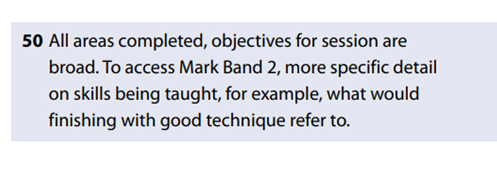Cambridge Nationals: how to use our candidate exemplars effectively
03 April 2024
Mark Sirot-Smith, Business and Economics Subject Advisor

In this blog I’ll explain the purpose of the candidate exemplars for our Cambridge National qualifications and share some tips on how to make the best use of them.
About the candidate exemplars
Our candidate exemplars use candidate work from the 2023 series and are provided to help you assess your own candidates’ work.
On each piece of exemplar work the principal moderator has indicated the criteria that were considered and how the marking criteria was applied. The commentary provided should be the focus for teachers. The resource is provided to show how marks have been applied in response to a non-examined assessment (NEA) task. It is not intended to be a model answer or used as one. The candidate exemplars are for teacher use only and should not be shared with students.
Before we get into how to use them, here are a couple of reminders.
Candidates’ exemplars are real students’ work and therefore may show good and bad practice
Since the new specifications were introduced in 2022, performance objective (PO) 1, ‘recall knowledge and show understanding’ is not assessed in any Cambridge National NEA. Some candidate exemplars include large amounts of PO1 work, which does not gain any marks and takes away time that the candidate could use for the set tasks.
The principal moderator does draw your attention to this, for example in this extract from a candidate exemplar for Enterprise and Marketing (R068), in which the principal moderator identifies the whole paragraph as theory:

Tip: Make sure you read the principal moderator’s comments (in the column on the right-hand side).
Tip: Make sure students are clear about what they are expected to produce as evidence in their NEA tasks and what it not needed.
Candidate work at low, medium or high may include work from all the mark bands
Do not assume that high-level work will contain only mark band 3 (MB3) work or that medium-level work is all MB2. In most cases the work produced will be a spiky profile and may be from more than one mark band. In each case, the principal moderator’s comments will identify why the higher mark band was not achieved and what else the candidate needed to do.
For example, in this extract from a medium-level candidate exemplar for Sports Studies (R185), the principal moderator identifies the need for specific detail on skills, in order to achieve MB2:

Tip: Make sure you read the principal moderator’s comments (in the column on the right-hand side) to see what mark each strand has been awarded. Do not assume the work is all at the mark band based on the name of the file.
Top ways to uses the exemplars
- Understanding NEA requirements. Before teaching a unit, look at sample candidate exemplars to understand what evidence and depth students need for their NEA tasks. This helps in planning lessons effectively.
- Internal standardisation. Use exemplars for internal standardisation. Encourage discussion among teachers to ensure consistent standards across teaching groups. This helps in marking accurately and maintaining common standards across teaching groups.
- Benchmarking student work. When marking students’ work, keep exemplars open for reference. Reflect on the Principal Moderator’s commentary to decide on mark bands. Always remember that students can approach the assignment tasks in a number of ways and the exemplars are only a small example of ways that these students have produced their work. There are other equally good ways students can complete their NEA assignments. These exemplars are supplemental support to our other published documents. This includes the specification, assessment guidance and understanding the NEA videos.
Finally, do remember that if you have any concerns regarding the delivery or assessment of your Cambridge National, the subject advisor team are here to help you. Contact us at support@ocr.org.uk.
Stay connected
Share your thoughts in the comments below. If you have any questions, you can email us at support@ocr.org.uk, call us on 01223 553998 or message us on X (formerly Twitter) @OCR_BusEcon. You can also sign up to subject updates to keep up-to-date with the latest news, updates and resources.
About the author
Mark recently joined OCR, after over 30 years in teaching, lecturing and senior leadership in a variety of secondary schools and FE colleges. He loves being active: walking his dog, playing tennis and visiting his three grown-up children in the midlands and north, especially if it coincides with a Crystal Palace away game!